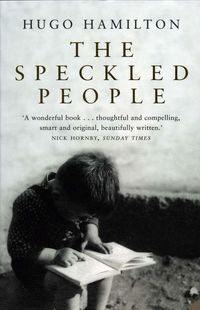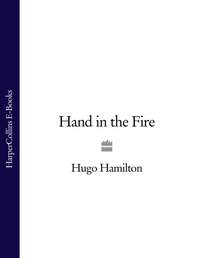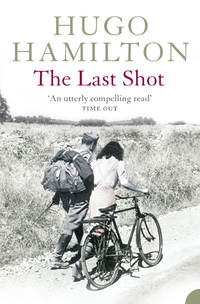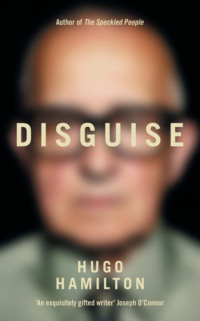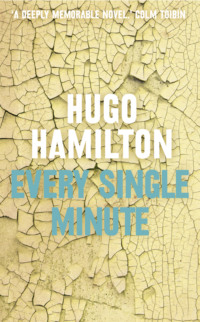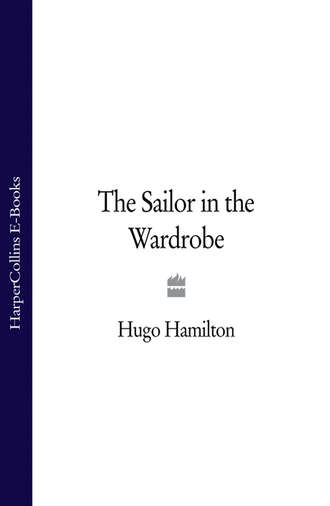
Полная версия
The Sailor in the Wardrobe
All over the world, there is trouble on the streets now and trouble inside the houses. Civil rights demonstrations. People marching with placards and throwing stones at the police. At dinner, my father slaps his hand on the table and says things are changing in Northern Ireland at last, things that were left unfinished for years. He points at the TV and says he can’t wait for the future when things will be just like they were in the old days before the British.
You can see them throwing stones and petrol bombs at the police. Everybody talking about a place called the Bogside in Derry where the police were firing tear gas at the people in the street and you saw the crowd of protesters, some of them like cowboys with handkerchiefs over their mouths and noses, picking up the gas canisters and throwing them back. My father says it must be against the Geneva convention to use CS gas on people in the street, where there could be children and old people nearby with bad chests and lung conditions. At the battle of the Bogside, you saw them throwing petrol bombs down from the roof of the flats. The people of Derry were winning because the women start factories of petrol bombs and there was an endless supply that kept raining down onto the police. You saw a policeman on fire, screaming and kicking the flames away off his legs. Other policemen coming to help him, beating the fire off with their shields. Eventually the police lost the battle and the British army was called in. My father said the picture was complete now with the four allies from the Second World War still doing the same thing, as if they could not get out of the habit. It was French troops in Algeria, Russian troops in Prague, American troops in Vietnam, and now the British troops in Northern Ireland. We heard Jack Lynch saying that we could no longer stand idly by and watch Irish people getting hurt again. I even made a petrol bomb myself one day, because I was working in a garage at the time. But then I had nothing much to throw it at, so I just lit it and watched the earth on fire in the lane at the back.
When the British soldiers first arrived in Belfast, the Catholic people thought it was a great liberation because at least they were no longer going to be ruled by their Protestant neighbours. We saw pictures of women on the streets, handing out cups of tea to the soldiers and saying they were welcome. But that didn’t last long and very soon, the British soldiers were despised even more than their neighbours. The same women who had given them tea were seen kneeling down in the streets, banging dustbin lids as the soldiers went by in Saracen jeeps. The army of occupation, they were called now, and you could hear the sound of dustbin lids echoing all over the city like a long shout, like the curse of history following them wherever they went through the streets. One day I came home and saw my mother banging the dustbin lid on the granite step in front of the house. I could hear it echo along the street and it looked like she was carrying out a solitary protest of her own. When I asked her if she was doing it against the British, she laughed out loud and kept repeating it all evening, because no such thing had ever even entered into her head and she was only banging the lid to try and knock the snails off.
And now the long shout was coming after Dan Turley. I heard it very clearly, as if it was right beside us, or above us. Just one shout, like an accusation that would not go away. Dan’s surname left hanging in the air all around us. I knew how threatening it was to hear your own name being shouted out like this by some invisible voice. Your own name like the worst insult in the world, following you down the street like a million banging dustbin lids.
We had struck a shoal and were pulling in the mackerel. Dozens of them, leaping into the boat as if they were surrendering. The boat was full of slapping as the fish jumped around inside the metal box. I once asked Dan what it was like for mackerel. Was it the same as drowning for us or was it more like getting drunk, suffocating with too much oxygen, like when you breathe in fast and get dizzy? But he said nothing. He never says much. He doesn’t even call me by name. He just mutters and sometimes you have to guess what he’s saying in his Northern accent. I know very little about him. I know he’s an old man, over seventy. But he doesn’t want conversations about where you’re from and what age you are and how a mackerel feels when he’s dying on the bottom of the boat, staring at people’s shoes up close. All he told me once was that mackerel never stop moving. They can’t stay still. They’re on the run all the time, travelling at thirty miles an hour underwater without stopping.
Dan ignored the shout and pretended it wasn’t his name. Maybe he had heard this kind of phantom shout many times before, but then he must have lost his concentration, because the line suddenly slipped out of his hand and ran out across the gunwale. He tried to catch it, but a hook buried itself deep, right in between thumb and forefinger.
‘Hook,’ he said through his teeth and I saw the blood in his hand.
Ever since I started working at the harbour, I have been dreaming about hooks in jaws. Hooks in eyes, hooks in every part of your body. Hook torture and hook crucifixion. Maybe I should have got up one night and drawn it down on paper so that it would go away, because now it was happening in front of my eyes.
He was helpless for a moment, staring down at his hand, gripping it with the other hand, trying to squeeze out the pain with his thumb and forefinger, as if it was the sound of his own name that hurt so much. The blood was already leaking into his palm, mixing in with the blood of mackerel and fish scales. Outside the boat, the mackerel were tugging at the line, swimming around in circles, trying to get away and digging the hook deeper. I knew what to do. I pulled in my line and threw it across the floor of the boat with the fish still on their hooks. There was no time to do the same with his, so I got the filleting knife and cut it. The remaining mackerel were released and swirled away on their hooks, shackled to each other for ever by this piece of lost line, swimming down and sideways as if they couldn’t agree where to go at all.
He examined his hand and started swivelling the hook around, forcing more blood out and making everything worse. Then he held his hand towards me. I didn’t trust myself and felt his hand shaking as I tried moving the hook around slowly like a surgeon to see if I could reverse it out without doing any more damage.
‘Pull the fucken’ thing,’ he growled.
I had to extract it quickly. Pretend it was another mackerel. I pulled as fast as I could, but it tore a hole and left a bit of loose flesh dangling. He took in a deep breath and narrowed his eyes. I let go of his hand and saw blood on my fingers. Then I dropped the hook on the floor of the boat with the soggy, brown cigarette butts, because we were already very close to the island, almost on top of the rocks, and there was no time to lose. I could see the ribbons of black seaweed waving and the shape of the rocks, like large, luminous green creatures swimming underneath, waiting for us. He moved aside so that I could start the engine as fast as possible. He sat holding his clenched hands, as if he was praying, with the blood running into the sleeve of his jacket. I turned the boat around and the engine scraped across the back of one of the rocks beneath us. It made an underwater groan, but I managed to steer away from danger and head towards the harbour.
On our way back, the sun disappeared behind a cloud, so I could see everything very clearly without holding my hand up over my eyes. The land came back into view, but there was nobody to be seen on top of the rocks. I looked at the fish on the bottom of the boat. Most of them were rigid by now, but one or two of them were brought back to life again as the boat bounced across the water, wriggling fiercely one last time before going quiet again. Dan reached his hand out over the side of the boat and washed it. He stared across the water behind us, dreaming with his eyes open. He didn’t want to talk about it and I knew he didn’t want me to tell anyone. When we got back to the harbour, he left me to tie up the boat and carry everything in, while he got out and walked away with his hands in the pockets of his jacket. He was not in a rush. He walked back across the pier and disappeared inside the shed as if nothing had happened.
The harbour is a place of nightmares, but it’s where I want to be. I love the sight of the wide open bay and the clouds, like big handwriting in the sky. I love the moon shining on the water at night, like a soft, powdery white light drifting across the world. I belong to the sea, like my grandfather, John Hamilton, the sailor with the soft eyes who got locked into the wardrobe by my father. I know he lost his life when he fell on board a British navy ship during the First World War. And after the Irish liberated their country from British rule, he disappeared, because my father wants Ireland to be fully Irish and thinks his own father betrayed his country. When we were small, we got trapped in the wardrobe along with the sailor once and had to be rescued. I am the same age now as my grandfather was when he joined the navy, so I’m stepping into his shoes. I work on the boats and go out fishing like his people did in Glandore, on the coast of West Cork. Sometimes I sneak upstairs to the wardrobe while my father is at work and look at the photograph of John Hamilton in his sailor’s tunic. I wonder if I look like him. I want to be a sailor and travel all over the world like he did before he died. I’m going to become my own grandfather. I’m going to take his name and help him to escape out of the wardrobe.
Three
On my way home from the harbour, I see people going swimming with towels rolled up under their arms. The tide is in and I see them changing, leaving their clothes in bundles on the blue benches. Girls doing the Houdini trick behind their big towels and coming out in their swimsuits. I stop for a moment to watch them jumping off the rocks, yelping and splashing as they go in. They swim around to the steps and come up all wet and skinny, then do the whole thing all over again. Girls ganging up on the boys and them all going in together. One of the boys on the diving board pretending to die with a guitar in his hands, singing ‘I’ve got that loving feeling’ as he falls backwards with a big splash. I know that as you go into the water like this, there is a moment when you stop moving altogether and just hang in the same spot underwater without breathing, surrounded by silence and air bubbles before you begin to move back up towards the surface. You feel no gravity. You become weightless.
After dinner every evening, my father is sawing and hammering. This time he’s building a big music centre. I’ve seen the plans, with separate sections for the turntable and the amplifier, and lots of compartments to store the records in. He discovered the whole thing in a German phonographic magazine which claims that you can have a live orchestra in your own front room any time you like. It’s taking a long time to build and even longer for all the parts to arrive in from Sweden and Germany. The speaker frame is already finished and standing in the front room – a giant, triangular-shaped wooden box about five feet high, taking over an entire corner to itself. It’s been constructed with cavity walls filled with sand to stop any distortion in the sound. He has been drying the sand out in small glass jars for weeks, placing them in the oven for an hour at a time and then pouring them into the wall around the speaker. There’s even a small shutter at the bottom to let in the air.
Now he’s begun to work on the cabinet itself. He’s got a pencil stub balancing on the top of his ear as he explains to us how each panel has to be dovetailed and fitted together, how each compartment has to have its own door on piano hinges with its own little lock and key. All the wires connecting up the turntable and the amplifier at the back will be hidden. Very soon, the system will be up and running, and my mother says we’ll be able to hear them turning the pages in the orchestra. But then he’s looking at the plans again, turning the sheets upside down and wondering why one part of the unit refuses to fit. He says he should have marked every section with a little arrow or a number. My mother reads over the instructions once more and he holds pieces of wood in his hands, sticking his tongue out the side of his mouth. Everybody in the house has to be quiet and not make things worse, but then it comes, at the worst possible moment, a word in the English language, the foreign language, the forbidden language.
‘Help.’
It’s my sister Maria, trapped under the stairs. When you open the in-between door in our house while somebody is in the pantry under the stairs, they won’t be able to get out. We used to take prisoners and lock each other in. Now and again it happens to my mother and she laughs because it’s like spending time in jail with only tins of peas and jars of jam all around you. This time it’s Maria accidentally locked in, but my father drops all the wood and comes storming out because he thinks it’s my fault.
‘What have you done?’ he shouts.
‘Nothing.’
The instant denial. My mother says it’s always the perpetrators who claim they were just minding their own business. You don’t deny something you didn’t do. But why should I feel guilty? I’m secretly thrilled to be accused in the wrong and stand there smiling until my father rushes forward to hit me on the side of my face. It comes so fast that I lose my balance. My hand goes up to my ear and I see the look of anger in his eyes. Sadness, too, as if he can’t help lashing out, as if it’s not really him at all, but the countless lashes he got himself that have suddenly compelled him into this summary punishment in the hallway. All the punishment in history passed on, lash by lash.
‘Go to your room,’ he shouts.
My mother tries to stop him, but it’s too late and I’m already walking up the stairs with heavy feet, turning around to give him a last look of poisoned glory. It’s a miscarriage of justice. You have punished the innocent. And then to confirm it, Maria comes running up the hallway.
‘He didn’t do it.’
‘It’s a mistake,’ Franz echoes behind her.
‘Innocent as usual,’ my father mutters. He goes back to try and figure out which direction each piece of wood should be facing and now it’s my turn to slam the door of my room and stand at the window with my ear boiling. I know what it’s like to be guilty – it makes you helpless and sick. It’s like eating something really bad, like dying slowly with your stomach turning inside out from poison. Rat powder. Blue pellets for snails and slugs. I see them out there in the garden, dragging themselves away, leaving a thick yellow trail of slime and curling up in agony.
When my father comes up to apologize, I refuse to speak to him. I don’t want reconciliation. I want to hold on to my anger. My moral victory. But my mother is there pushing him into the room, forcing us to make up and shake hands. He holds my face and asks me to look him in the eyes. Then he embraces me and admits that he’s made a terrible mistake. I feel like a child, with my head rammed against his chest. I can smell the sawdust in his jacket. I can hear his heart beating and I can’t withhold my forgiveness any longer because he is close to tears with remorse. Then he stands back and smiles. He says he is proud of me and admires me for taking the punishment like a man, like Kevin Barry going to his execution. My mother says I’m such a brave person, like Hans and Sophie Scholl going under the guillotine for distributing leaflets against the Nazis.
And then they’re gone downstairs again. I’m left alone in my room, listening to them discussing the measurements once more. Suddenly all the wooden sections fit and I can hear him hammering away with a clear conscience while I remain upstairs, staring out at the slow death in the garden. I can’t stop thinking of Kevin Barry in the moment before his execution, before they bound a cloth around his eyes. I wonder what his last memory was before being shot and if he was thinking about the time when he was growing up as a boy and never even dreamed of this end to his life. And I can’t help thinking about the blade slicing through Sophie Scholl’s neck and how her head must have fallen forward with a heavy thump. Even if she was hooded, there must have been some reaction on her face. Was it one of defiance or did she look shocked? Did she blink, or gasp, or sneeze maybe? Was her mouth open and did she try to say something? Could she still hear her executioners talking for a moment, saying that it was all done now, filling in the documents and marking down the exact time of death? Could she hear their footsteps before the darkness closed in around her? And what were her last thoughts, of her mother and father maybe, of happy moments in Germany, of the time they went hiking together in the mountains?
And then one day the music system is finished.
There’s a smell of varnish and French polish in the house for days. When the amplifier finally arrives, we stand by watching my father as he carefully takes it out of the box and fits it into its compartment perfectly. He starts connecting up the cables and there is a factory smell every time he switches it on for a test run. He keeps working till late at night and then there is a sudden blast through the speaker, like an explosion waking up the whole house, maybe even the whole street. We jump out of bed and come running out on the landing, but he’s downstairs smiling and blinking like a great inventor because it’s all functioning perfectly like the magazine said.
On the evening of the unveiling, my mother makes sure everything looks right. She puts an embroidered cloth on the coffee table in the front room, with drinks and small cakes. She pours glasses of cognac and you can see how proud they both are when my father unlocks the cabinet. It’s such an achievement, my mother keeps saying, as we watch him putting on a record of Elisabeth Schwarzkopf. He tells us to listen out for his favourite notes on ‘Panis Angelicus’ by John McCormack, followed by Kevin Barry and some songs in Irish like ‘An Spailpín Fánach’. Then it’s back to Beethoven and Bach. And after that he has a new idea. To see how high the volume will go without any distortion in the speaker, he makes us all sit at the top of the stairs while he puts on Bruckner. We hear the crackle of the needle going down on the record. Then he comes limping up the stairs to join us, sitting in rows at the back like a concert hall, while the full orchestra begins playing in the front room with every instrument all at once.
When the concert is over, I watch him closing the cabinet and wonder where he hides the keys. He waits till everyone is out of the room before he puts them away, so it takes me weeks to find them. I keep looking everywhere, while he’s out at work. I start thinking just like him and imagine where the best place would be to hide something from your own son.
Inside the big speaker, of course. In the vent at the bottom, to the left. While I’m at home on my own one day and everybody is out of the house, I go into the front room and open everything up to put on my own record, not one of the German records or any of the Irish songs, but one that I bought myself some time ago with money saved up. It’s a Beatles single called ‘Get Back’. I prefer the flip side, though, which has John Lennon singing ‘Don’t Let Me Down’. I used to play it whenever I could on the small turntable before that broke, but now I want to hear it properly, on my father’s new system, as if the Beatles are in the front room with me.
I have to be very careful because even if I leave the tiniest thing out of place, he’ll know that somebody has been interfering with his things. I have to become a real criminal. I have to take a photograph in my mind of everything I touch so I can put it all back exactly as before. Then I place the record on the turntable and turn up the volume. ‘Don’t Let Me Down’. I play it again and again so that people can hear it all over the street and they must be thinking it’s strange that my father would be at home putting a song like that on his new music cabinet during the day.
It’s like blasphemy, even hearing the words in our house, saying ‘you done me good’.
The song gets more perfect every time I listen to it. I sit back in the armchair and see the girl across the street leaving her house and I know that for a few moments she must be listening to the same song as me, until she walks around the corner out of sight. Music makes people look weightless. I imagine my mother and father floating around the front room like astronauts every evening while they listen to Mozart. I can see them drinking glasses of cognac without having to hold them. Family photographs of Onkel Gerd and Ta Maria lifting off the mantelpiece up into the air. Franz Kaiser and Bertha Kaiser in Kempen floating like an ascension with the market square and the church with the red roof below them. The whole family including Onkel Ted with his white collar drifting up the stairs. All kinds of vases and table lamps and pencils and books about German and Irish history flying around under the ceiling. Now it’s me listening to John Lennon and it feels like the whole world has become weightless. I feel no gravity and my feet go up onto the side of the armchair. I’m drifting out the window. Floating down the street, up above the roofs of the houses and the church, looking down at the people standing at the bus stop. Up and out and down over the harbour where I can see the lads sitting on the trellis outside the shed and Dan Turley fishing. Out across the sea I go, floating away until the place I come from is only a tiny speck below me.
Afterwards I have to put everything back. I forget nothing. I lock everything up and place the keys back inside the speaker vent in exactly the same shape as I found them. Nobody would ever know, and by the time my father comes home the echo of John Lennon is long gone, remaining only in my head and keeping me afloat.
At the dinner table, my father gives me a look of deep suspicion, as if he knows I’ve done something. There is a frown on his forehead, but he can prove nothing. He would have to take fingerprints. I’m innocent and untouchable. He knows that I’m breaking away now but there is nothing he can do about it. He knows that I go down to the harbour every day since the summer began, speaking English like everyone else and no longer loyal to his crusade for the Irish language. He knows that I don’t want to be Irish like him, that I don’t want to look like him or even listen to the same music or read the same books. I look back across the table at him, speaking English in my own head, repeating the forbidden words ‘she done me good’.
And then I remember something that brings me back down to the ground again. I realize that while I was paying attention to every detail, scrupulously putting everything back in its place, I must have forgotten the most important thing of all. I left John Lennon on the turntable.
Now there’s going to be trouble. I can feel the weight of my arms on the table. I’m such a bad criminal. I go back over everything step by step. I know I turned the speed from forty-five back to thirty-three. I know I locked each and every one of the compartments. I did everything right, down to the last precise detail, but I was concentrating so much on replacing everything that I forgot the most obvious thing. When my father goes to play music after dinner, he’ll find a strange disc on the turntable that he would never in a million years allow into the house.
I stand up from the table in a panic. The chair makes a yelp behind me and I rush around past my mother to get to the door. Everybody looks up thinking I’m going to be sick. They stop eating to see me running past, trying to get away as fast as possible. I want to rescue John Lennon. I want to run to the front room, take out the keys quickly and remove him from the turntable before it’s too late. But then I stop at the door and look back at them all sitting around the table as if they have become frozen in time. My brother Franz has a piece of carrot stuck on his fork which has stopped halfway up to his mouth. My mother has a jug in her hand but the milk has stopped pouring. My sisters are all shocked with their eyes wide open and Ita’s mouth is full of mashed potato as if she’s blowing up a balloon. My father is getting ready to follow me. He puts his knife and fork down with a clack. His backside is raised up from the chair, in mid-air.



